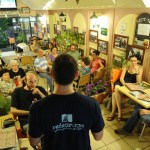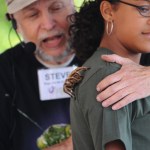Science Education
For now. This just in from the National Center for Science Education:
Creationism won't be taught in the public schools of Livingston Parish, Louisiana -- at least not yet. The Baton Rouge Advocate (August 1, 2010) reports that "The Livingston Parish School Board won't try to include the teaching of creationism in this year's curriculum, but has asked the School Board staff to look at the issue for possible future action." At a July meeting, inspired by the Louisiana Science Education Act, the board formed a committee to explore the possibilities of incorporating creationism in the parish'…
... from the National Center for Science Education.
Click the picture to get the PDF of Darwin's Universe: Evolution from A to Z
.
Are quantum physics more intelligible after a beer or two? That might be an illusion, but you wouldn't know it from the enthusiastic crowd who packed a Rehovot restaurant/pub last Thursday evening to hear a talk on the subject given by one of the Weizmann Institute's research students. Even those imbibing out on the tiny, sweltering balcony, where the sound system barely reached, found themselves enjoying the atmosphere and the question-and-answer session, which continued on for over an hour after the talk.
That scene repeated itself across town, from the Irish pub in the nearby science…
Barbara Forrest, author of Creationism's Trojan Horse: The Wedge of Intelligent Design, has a major blog post addressing the current maneno in Louisiana. A Parish school board there wants to place creationism on equal or higher footing than evolution. Read Barbara's piece here.
Unless they are stopped which, frankly, does not seem very likely.
The Livingston Parish School Board, in Louisiana, is poised to enthusiastically support the introduction of creationism into the school curriculum as a requirement, and possibly even toss out evolution. You people in Louisiana are truly a bunch of morans*. You do know that, right?
Barbara Forrest, author of Creationism's Trojan Horse: The Wedge of Intelligent Design, has written a letter that you may want to read about the school board's intentions, and the NCSE has a detailed press report here.
Here's the thing that is so…
Amgen, a leader in biotechnology, and the Amgen Foundation are committed to supporting science education programs and are proud to be a sponsor of the USA Science & Engineering Festival to further encourage bright young minds to explore a future in science and strengthen science literacy.
Jean L. Lim, President, Amgen Foundation
"Amgen applauds the Festival for bringing together leaders in science education to create an exciting educational event for students and the community," said Jean J. Lim, president of the Amgen Foundation. "The Festival can leverage the passion and expertise…
The Origins of Kindness:
Listen to our interview with science historian Oren Harman. He's our guest in this Science Forum discussion.
Harman is a professor at Bar Ilan University in Israel.
If evolution favors the survival of the fittest, how did kindness and selflessness evolve? The search for that answer is the subject of Harman's new book, The Price of Altruism.
It tells the story of George Price, a scientist who developed an equation that explains how natural selection can favor altruistic behaviors.
As Harman writes, George Price's life and work were full of contradictions.
Disappointed…
Marie-Claire Shanahan is an Assistant Professor of Science Education at the University of Alberta, in Edmonton, Alberta, Canada. As a former science teacher, she was always surprised by the ways that students talked themselves out of liking science - and she decided to do something about it. She now researches the social and cultural aspects of science and science education, especially those related to language and identity.
Marie-Claire and I first met online, then also in Real World when she attended ScienceOnline 2010, after which I interviewed her for my blog. You can check out her…
And we need your help to move it. Please click here so the global network of DNS servers knows that you want to visit the MnCSE. You should really visit the site anyway, it's very cool, even if you are not a Minnesota. I love the graphic thingie on the top of the right sidebar .... click the picture to learn an interesting thing about evolution or related topics.
So? What are you waiting for? Click here!
And, if yo are a parent, teacher, student, or academic interested in excellent science education in Minnesota, bookmark the site and come back often.
Thank you very much, that is all.
If you're a high school or college student with an interest in biomedical sciences, or healthcare careers, the NIH has set up an electronic mentoring program to help you find a guide.
The mentoring happens via email and students must be 16 yrs or older.
The site claims the mentors are carefully screened. I'm not sure what screening means to the NIH. At our local high school, they used to require that mentors get fingerprinted and have a background check. Maybe NIH screening means you have to have gotten a grant funded or be registered in the NIH commons.
Please note: the program is…
And we're talking about bigots and creationists in Alberta, which I figure is more or less the Canadian equivalent of Texas .... the dumbest province in the Great White North.
Starting this coming school year, parents will be able to "opt" their children "out" of certain lessons, such as those that deal in any way with Teh Gay, or with religion. Apparently, it is thought that science that conflicts with religion will be counted as religion, so that means kids can get out of science classes.
And I would not assume that this applies only to evolution. Math, physics, all of it conflicts with…
Our July Science Café (description below) will be held on Tuesday 7/20 at Tir Na Nog on S. Blount Street. With the disastrous BP Gulf oil spill now continuing into its third month, every day we are reminded of the challenges our country faces with regards to our energy production and consumption. Can nuclear energy be a viable answer for some of our energy needs? Our café speaker for the evening will be Dr. David McNelis, the Director of the Center for Sustainable Energy, Environment, and Economic Development at UNC's Institute for the Environment. It should be an interesting evening…
Serpentine (as known as serpentinite), the current (and potentially soon-to-be ex-) state rock of California.
This does not have a direct connection to volcanoes, but it sure is about geology and the science in the news. State Senator Gloria Romero of California has sponsored a bill to change the California state rock from serpentine because, as she claims:
"[Serpentine] contains the deadly mineral chrysotile asbestos, a known carcinogen, exposure to which increases the risk of the cancer mesothelioma ... California should not designate a rock known to be toxic to the health of its residents…
I can see this as instructional material while dissecting a real frog, getting a feel for its texture, smell, seeing the individual differences between the way multiple frogs look on the inside, but not as a replacement of the real thing. What do you think?
Last week, my SciBling Jason Goldman interviewed me for his blog. The questions were not so much about blogging, journalism, Open Access and PLoS (except a little bit at the end) but more about science - how I got into it, what are my grad school experiences, what I think about doing research on animals, and such stuff. Jason posted the interview here, on his blog, on Friday, and he also let me repost it here on my blog as well, under the fold:
Here at Thoughtful Animal headquarters, we're starting a new series of seven-question interviews with people who are doing or have done animal…
From the NCSU Libraries News:
The best in the world of science illustration will be hosted in a beautiful display featured in the D. H. Hill Library Special Collections Exhibit Gallery at North Carolina State University from June 14 through the first week in August. The Guild of Natural Science Illustrators (GNSI), founded at the Smithsonian Institution in 1968, is working with the NCSU Libraries to present "The Art in Science: Annual Exhibit of the Guild of Natural Science Illustrators." Ranging from pen and ink drawings to the latest digital animations, the juried exhibit is a great chance…
The latest issue of Evolution: Education and Outreach (volume 3, number 2) is in honor of -- if a few months in advance of -- the sixty-fifth birthday of NCSE's executive director Eugenie C. Scott. Edited by NCSE's deputy director Glenn Branch (who contributed "Three wishes for Genie" by way of introduction), it contains essays by Nicholas J. Matzke, Robert T. Pennock, Barbara Forrest, Raymond Arthur Eve with Susan Carol Losh and Brandon Nzekwe, Lawrence M. Krauss, Robert M. Hazen, Kevin Padian, Jay D. Wexler, Kenneth R. Miller, Brian Alters, and Carl Zimmer. Plus there's a biographical…
Yesterday, Chris Mooney published an article in Washington Post, If scientists want to educate the public, they should start by listening. It has already received many comments on the site, as well as on Chris' blog posts here and here and here. It will be followed by a longer paper tomorrow, at which time this link will work and you will be able to read it.
The blogosphere has not remained silent, either, with responses by, among others, Orac, Pal MD, Evil Monkey, Isis and P.Z.Myers. Most of them, as I do, agree with the article about 3/4 through, and are, as I am, disappointed in the…
Let's face it, we as a society have a limited, even poor, image of scientists and engineers. For instance, just ask the average fifth-grader to draw his or her perception of a scientist and you'll most likely be given a depiction of a white male with wild Einstein-like hair, eccentric habits and attired in a lab coat, coke-bottle spectacles while working in an ivory tower laboratory...some might even describe him as "mad."
Science's poor public image goes even deeper. In a survey conducted in 2007 by the Museum of Science and Industry in which 1,304 American adults were asked if they…

